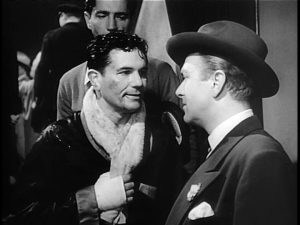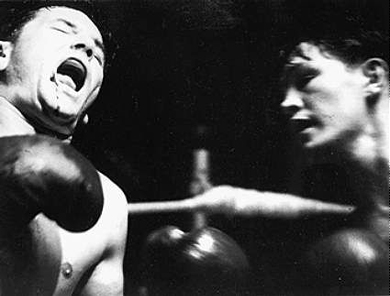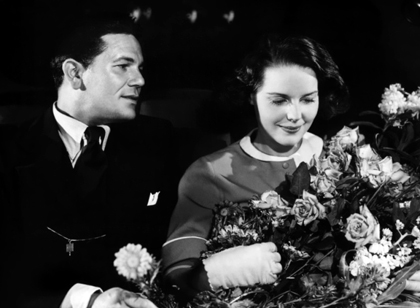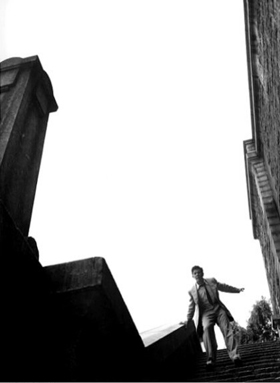
 |
|
|
|
Billy Wilder frequently made acid remarks about serious topics that neatly sidestepped any discussion of politics. About The Hollywood Ten, the unfriendly witnesses before the HUAC, he said, "Two of them are talented. The other eight are just unfriendly." When we look at the effects of the blacklist today all that gets discussed is the politics, not the essential ugliness of a time when the daily business of a minority of zealots and opportunists was destroying careers and ruining lives. Actor-author Robert Vaughn quite accurately said that there were Only Victims. Produced just as the political tide was rising, the two features just being released on Blu-ray by Olive Films may be the most important titles in the battle for ideas in Hollywood. They were made by people who cared about the content of movies and who wanted film to achieve social change. Both star John Garfield, the actor most severely impacted by the witch hunts. He was hounded and badgered to an early death from a heart attack, just four years later. The main credits of Body and Soul and Force of Evil overflow with top Hollywood artists and craftsmen, and an inordinate number of people whose names would be banished from the screen. All this would be empty talk if Body and Soul and Force of Evil were ordinary movies. Political messages do not normally make for great entertainment. But these are two of the most intelligent and persuasive socially themed movies ever made.
|
|
Body and Soul is one of the greatest boxing movies ever, and there have been more than a few good ones. The subgenre's combination of sport, brutality, sex and money has always been hard to beat. A prizefighting story is an American version of a bullfighting saga. The innocent and ambitious boxer defies his mother's wishes to step into the ring. With success come money, easy women and disillusionment. Things can wind up in triumph or tragedy, as the formula leaves a lot of room for interpretation. Director Robert Rossen and writer Abraham Polonsky, both Marxists and anti-fascists, made their reputations with this picture. Polonsky served with the OSS during the war. Body and Soul uses its boxing story to criticize capitalism, specifically the idea that the profit principle reduces people to a commodity that can be bought and sold. 
When his father (Art Smith) is killed in an explosion set off in the speakeasy next door by gangsters, Charley Davis (John Garfield) forbids his mother (Ann Revere) to take charity and trains as a prizefighter. Local promoter Quinn (William Conrad) introduces Charley to promoter Roberts (Lloyd Gough), who is quick to get the boy fighting. When he wins, Charley finds he can make plenty of money. But his best buddy Shorty (Joseph Pevney) thinks that Charley is being exploited: Roberts and other hoods control who fights and who does not - and sometimes who will win. They split up 'pieces' of Charley's purses while Charley takes all the risks. Both Charley's mother and his devoted girlfriend Peg (Lilli Palmer) are alienated by Charley's attitude. Roberts managed older boxer Ben Chaplin (Canada Lee) until an injury in the ring forced his retirement. Roberts wants to put Ben back in the ring, even though a bad punch would kill the man. Body and Soul is such an expertly written and directed drama that one never feels "messaged" by it; this is clearly why the film was such a success in 1947. The boxing scenes were considered revolutionary even when the film was new. James Wong Howe shot them handheld and reportedly even on roller skates to get a jerky documentary look; he overexposed the scenes a bit to better resemble the sweaty, overheated look of news film. Although Martin Scorsese received kudos for recreating the look in his 1980 Raging Bull, Howe's look had been recreated many times previously. Charley Davis' life seems a success story until he realizes that his talent and willingness to risk his skin is mostly benefitting others while also destroying his personal life. Gangsters fighting over booze profits inadvertently kill Charley's father, who ekes out his living selling penny candy. Terrified that he'll enter the fight game, Charley's mother signs up for charity but Charley throws the social worker out of the house. She protests that it would be better that he shoot himself than fight for money, but Charley response is fast and bitter: "You need money to buy a gun!" Peg is an artist. She compares Charley to a tiger and supports his decision to do what he wants to do. In a telling move Peg later leaves Charley and instead stays with his mother. They await his return to reason, like heroines in a Greek play. Meanwhile, Charley sees the cold tactics of Roberts first-hand. The loyal Shorty is pushed out of his managerial position, leaving nobody to look out for Charley's interests. When Shorty squawks, the mob moves in. Charley wins the championship title but soon goes soft. Peg leaves, cueing the ambitious playgirl Alice (Hazel Brooks) to claim Charlie's dance card. But the venal Roberts, who risks little and rakes in the bulk of the profits, is Charley's real enemy. Roberts uses up boxers, discarding them when they become incapacitated. The fights are rigged to maximize Roberts' yield; when at-risk boxers are coaxed into the ring, Roberts dismisses his responsibility by saying, "Everybody dies." Ben won't yield to Roberts' harassment when he becomes Charley's trainer, which leads to more violence. It all winds up with Charley's bold rebellion, when he refuses to throw "the big fight". This was a cliché even back in 1947, but in this story it works like gangbusters. 
Abraham Polonsky's original screenplay is beautifully constructed. The swift-moving show offers jokes and wit to balance its deep-dish moralizing. Many of the dialogue lines are classics, including the hardboiled final exchange. The credits on this film are a monument to Hollywood talent. Besides the creative James Wong Howe, the editor Robert Parrish, art director Nathan Juran and assistant director Robert Aldrich all became noted directors. Gunther von Fritsch directed the film's excellent montages. Interestingly, von Fritsch is the director kicked off of Val Lewton's The Curse of the Cat People. 'Company man' Robert Wise took over, a gambit that would serve him again on West Side Story. Robert Wise directed one of the high-profile boxing movies that followed. The Set-Up has no larger social message behind its powerful story of an aging boxer (Robert Ryan) trying to make a comeback. The 'evil' is all centered on one crooked manager; the sad world of boxing 'just is' and cannot be helped. Champion is like a rebuttal to Body and Soul. Every bad thing that happens to its boxer hero (Kirk Douglas) is his own damn fault. The Stanley Kramer production, a torrid exposé of the fight game, never makes a statement beyond the personal level. Body and Soul was a big hit. It doesn't draw political conclusions as much as it promotes moral values and a certain awareness of a social responsibility. But merely acknowledging the need for a social contract not to exploit one's neighbor is considered an ideological threat by some. One could populate a blacklister's graveyard with the number of participants in Rossen's picture knocked out of movie work by the witch hunts. Rossen recanted on his second appearance before the committee and was one of the few allowed to continue working. But Polonsky, Garfield, Anne Revere and Canada Lee were all blocked from employment. Polonsky wasn't allowed to renew his passport. Actor Art Smith was betrayed by his old buddy from the New York theater, Elia Kazan. Smith's name disappeared from screens in 1952, his career effectively ended. Lloyd Gough's name is misspelled in the titles, as 'Goff'. Five years later, Howard Hughes saw to it that Gough's name was removed from the cast list of Rancho Notorious. Gough's career was going well, but Notorious was his last feature film appearance for 25 years. 1
|
|
Abraham Polonsky, the screenwriter of Body and Soul both co-wrote and directed the next year's Force of Evil. Unlike the Robert Rossen movie it was not a popular hit. But it's an even greater work of art, probably Polonsky's best film and a very special one for star John Garfield as well. Taut and polished, this powerful film noir stylizes its dialogue to David Mamet extremes, creating a world where characters wear their morals and motivations on their sleeves. The dialogue is nothing short of amazing -- it sounds like poetry and yet retains a measure of naturalism. The movie chooses as its subject the Numbers Racket, a crooked game that millions of Americans played before legalized gambling -- which is of course itself merely a legalized racket. Force of Evil is an even more scathing accusation thrown at the American way. As racketeers become more sophisticated and corporations more ruthless, the distinctions between them begin to vanish. The show works primarily as a suspenseful and sometimes frightening thriller. But behind the genre trappings are subversive intellectual ideas, the healthy kind that ask us to question how the world really works. N.Y. lawyer Joe Morse (John Garfield) represents a big time syndicate to promote the transformation of the numbers racket into a legitimate lottery. But he has stepped over an ethical line by becoming the partner/employee of the syndicate head Ben Tucker (Roy Roberts). Tucker plans to consolidate neighborhood "policy stores" into a combine by rigging the game on the 4th of July. It's traditional that, for good luck, everyone bets on the number 776. When Tucker's experts make that number come up, all the independent stores will go broke. Only a few that join the syndicate on the syndicate's terms will be bailed out. Joe's problem is to keep his brother Leo (Thomas Gomez), an ulcerated small-time numbers operator, from being wiped out with the rest. Joe tries and fails to coerce Leo into taking a cushy spot in Tucker's combine. Meanwhile, Joe falls in love with Leo's innocent secretary Doris Lowry (Beatrice Pearson), a good influence who nags on the lawyer's conscience. Joe plays a game of 'corrupting' Doris, only to become less happy with his unsavory career choice. There are other snags as well. Ben Tucker's seductive wife Edna (Marie Windsor) keeps trying to compromise Joe. Worse, the competing racketeer Bill Ficco (Paul Fix) wants a place in the combine, and is willing to terrorize Leo Morse's employees to force his way in. 
Force of Evil is a progressive gangster noir that finds anxiety in the gray area between legal and illegal activity. In Byron Haskin's I Walk Alone gangsters court respectability by aping legit business. But that show limited its anxiety to a concern for what will become of its criminal hero. Polonsky instead indicts society at large, the whole system. He shows that crime is not an underworld, but a force that permeates normal urban life. Poor struggling businessman Leo Morse is not a criminal fat cat, and the employees at his numbers counting house are ordinary people making a living. Everyone is tainted by the illegal numbers game, which compromises the moral fabric of the community. 1Our hero Joe Morse begins with a narration that tells us he plans to make his first million in just a couple of days. An educated wise guy, his M.O. is to go for the cash and work out the details later. Joe feels unclean after contact with Leo. He can't tell his brother about the big fix and can't persuade him to run for cover to dodge financial ruin. Leo abandoned his own education to send his younger brother to college; Joe became a glitzy lawyer while Leo remained to struggle in the trenches. Defending his crooked life to his independent-minded brother and his guileless new girlfriend Doris only puts Joe's lack of ethics in relief. Tucker's combine is engineering a hostile takeover of policy throughout the city. Tucker doesn't care who gets hurt so long as the business plan isn't affected. Joe openly admits that he's only after the money. He knows he'd doing wrong but he still wants be a the good guy, a rich good guy. Force of Evil is rather like an inverse It's a Wonderful Life, with the desperate small 'businessman' Leo Morse corresponding to Life's George Bailey. Having friends, remaining virtuous (in Leo's case, staying loyal to his neighborhood people) and staying independent from corrupting power systems (Potter's banks, Tucker's racketeers) have completely different consequences in the two movies. George Bailey is a hero, whereas Leo becomes a martyr, a pitiful victim. Critics have always flipped over Force of Evil's flowery language. Leo's bombastic "No, no, NO!" tirade is as stylized as anything in David Mamet's works, and John Garfield's tentative verbal jousting with Beatrice Pearson almost approaches poetry. Their taxicab scene has been compared favorably with the more obvious dramatics of On the Waterfront. The scene concludes with a weird fade-out that speaks a different kind of moral doom. Garfield's Joe Morse is not a proletarian hero like the boxer in Body and Soul; he's a transgressor looking for redemption in Doris Lowry's eyes. Frustrated by Doris's ethical objections, Joe Morse hefts her up onto a high mantel in an empty room, visually asking, "Do you want to get into the swim of life with me, or stay up on the shelf?" The cornering of Leo in a bar uses a disturbingly somber classical music cue as a counterpoint to some extremely shocking violence, including perhaps the movies' most traumatic use of a gun pointed at a subjective camera. Force of Evil may also contain the birth of paranoid cinema. Joe Morse becomes concerned when Tucker warns him that his secret private phone line might be wiretapped: "A man could spend a lifetime trying to remember something he said." A tight series of inserts shows Joe putting the receiver to his ear, and listening to hear the "--click--" of the wiretapper picking up. 
The poetic symbolism takes wing at the finish. As Joe descends countless steps to the river Hudson (Styx) to recover a body, his narration repeats the word down for poetic emphasis, and promises that he'll rise again to "so something" about the corruption. What exactly Joe can do is anybody's guess, as he's just come from a gunfight and is up to his neck in criminal activity that's led to four deaths. Joe's personal salvation aside, Force of Evil is much more of a downer than Body and Soul. David Raksin's powerful music score does remarkable things in this final sequence. It reflects the heavy tragedy but also injects some beautiful touches, as if forgiving Joe Morse, and wishing him strength as he reclaims his soul. Although it remained unapplauded for decades, Force of Evil is possibly the artistic high point for both John Garfield and Thomas Gomez. It's a rare opportunity to see the wonderful Beatrice Pearson, a stage actress who made only two movies, this and the even more socially conscious Lost Boundaries. Pearson's Doris Lowry is delightfully vulnerable and conflicted - she keeps Joe Morse at bay with talk of morality yet obviously hopes that he'll sweep her off her feet. Marie Windsor (The Killing, The Narrow Margin) bats her enormous eyes to seduce the hero, but to no avail. Her small son is said to be played by Beau Bridges, but I think he must have been cut out of the film. Roy Roberts is convincing as the new kind of dull racketeer. Howland Chamberlain, Barry Kelley and Stanley Praeger hover around the periphery as weak or venal pawns in the film's tawdry underside. Olive Film's separately released Blu-rays of Body and Soul and Force of Evil are exemplary transfers of these extremely satisfying noir thrillers. I've never seen a truly good print of the boxing movie until now and for the first time can appreciate the film's distinctive sets and dramatic lighting. The boxing sequences are indeed very advanced. Force of Evil is even more of a revelation, with its beautiful cinematography of the canyons of New York City and the insistent music score by David Raksin. The film has inky blacks and an almost a velvety surface; toward the end the darkness of the night scenes are almost overpowering. Republic must at one time have planned a "Martin Scorsese Presents" branded line, for Scorsese appears in a somewhat perfunctory intro, saying that he thinks the film is important. Body and Soul and Force of Evil are important: they represent the height of liberal Hollywood filmmaking, before the ideological purges began.
On a scale of Excellent, Good, Fair, and Poor,
Body and Soul & Force of Evil Blu-rays (separate releases) rates:
Footnote:
1. Hughes proposed to re-shoot the credits for many earlier RKO pictures, to remove the names of "known subversives". I don't believe that he changed many films, if any.
Reviews on the Savant main site have additional credits information and are often updated and annotated with reader input and graphics. Also, don't forget the 2011 Savant Wish List. T'was Ever Thus.
Review Staff | About DVD Talk | Newsletter Subscribe | Join DVD Talk Forum |
| ||||||||||||||||||||||||